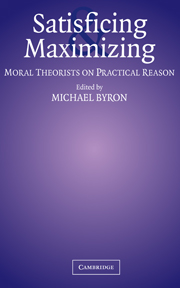Book contents
- Frontmatter
- Contents
- Contributors
- Introduction
- 1 Two Views of Satisficing
- 2 Satisficing as a Humanly Rational Strategy
- 3 Maxificing: Life on a Budget; or, If You Would Maximize, Then Satisfice!
- 4 Satisficing and Substantive Values
- 5 A New Defense of Satisficing
- 6 Satisficing: Not Good Enough
- 7 Why Ethical Satisficing Makes Sense and Rational Satisficing Doesn't
- 8 The Plausibility of Satisficing and the Role of Good in Ordinary Thought
- 9 Satisficing and Perfectionism in Virtue Ethics
- 10 Could Aristotle Satisfice?
- 11 How Do Economists Think About Rationality?
- Bibliography
- Index
5 - A New Defense of Satisficing
Published online by Cambridge University Press: 04 December 2009
- Frontmatter
- Contents
- Contributors
- Introduction
- 1 Two Views of Satisficing
- 2 Satisficing as a Humanly Rational Strategy
- 3 Maxificing: Life on a Budget; or, If You Would Maximize, Then Satisfice!
- 4 Satisficing and Substantive Values
- 5 A New Defense of Satisficing
- 6 Satisficing: Not Good Enough
- 7 Why Ethical Satisficing Makes Sense and Rational Satisficing Doesn't
- 8 The Plausibility of Satisficing and the Role of Good in Ordinary Thought
- 9 Satisficing and Perfectionism in Virtue Ethics
- 10 Could Aristotle Satisfice?
- 11 How Do Economists Think About Rationality?
- Bibliography
- Index
Summary
Satisficing versus Maximizing
It is widely maintained that self-interested rationality is a matter of maximizing one's own good or well-being. Rationality more generally is also frequently characterized in maximizing terms: The rational thing to do in any decision context is whatever is best in terms of one's interests or will lead to the greatest preference-satisfaction. This orthodoxy is surprising given that we often justify what we do, to ourselves and others, by saying that the option we prefer is not the best but is instead simply adequate, sufficient, or “good enough,” whereas a rejected alternative “more than enough,” “more than is needed,” or simply unnecessary because we are “satisfied,” “content,” or “fine as we are.” The prevalence of such locutions inspires some, most notably Michael Slote, to propose a “satisficing” alternative to the orthodoxy, according to which a person is rational if the preferred option is good enough, where options other than the best are good enough. In the self-interested case, which will be my exclusive concern here, the satisficing claim is that it is rational to prefer an option so long as it is good enough in terms of one's own good or well-being.
Proponents of maximizing conceptions of rational choice must claim that the justifications we give in terms of adequacy or sufficiency are either illegitimate or nonliteral: “Good enough” and other similar locutions are part of legitimate justifications according to the maximizing conception only when they are used elliptically, as a way of indicating that despite appearances the course of action is in fact best.
- Type
- Chapter
- Information
- Satisficing and MaximizingMoral Theorists on Practical Reason, pp. 77 - 105Publisher: Cambridge University PressPrint publication year: 2004
- 6
- Cited by

